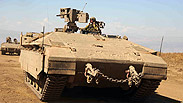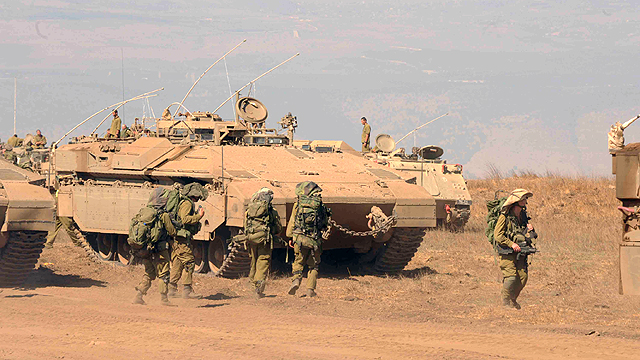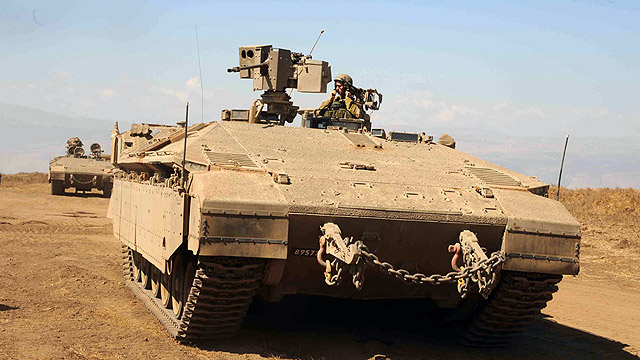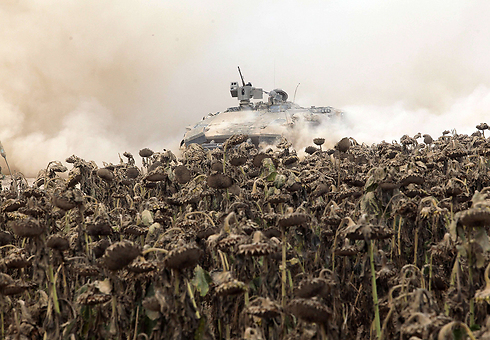
Despite deaths, IDF to postpone purchase of APCs
Four months after seven Golani soldiers were killed when an anti-tank missile hit their outdated APC, army top brass decides to postpone further talks on procurement of heavy APCs.
During a discussion held by the director-general of the Defense Ministry on Wednesday, with the participation of future IDF Chief of Staff Gadi Eisenkot and Planning Directorate chief Nimrod Sheffer, military officials lobbied to postpone further talks on procuring heavy APCs – despite the fact the purchase of the armored vehicles was one of the central lessons of the summer operation.
Even during the operation, after the outdated Golani APC was hit in Saja'iyya, defense establishment chiefs – including Defense Minister Moshe Ya'alon – declared the necessity of prioritizing the purchase of heavy APCs. The idea was to have enough of the heavy armor to allow all regular infantry divisions to operate within a combat zone littered with anti-tank threats, like in Gaza and Lebanon.
Behind the vocal declarations stood the military's intention to return to the original number of the heavy Namer APCs that the IDF had planned to procure during the 2007 multi-year plan.
At the time, IDF officials discussed the purchase of 500 heavy APCs. Following the massive cuts to the defense budget, the military request was reduced to almost half the original order.
Enter General Dynamics, the American defense firm contracted by the IDF to manufacture – based on Israeli specifications – Namer APCs and spare parts, even as domestic manufacture continued in Israel.
The decision to transfer part of the production line to the US was borne of a budget battle back in Jerusalem, as the US-made APCs were built using the military aid package received by Israel.
Israel had the option of manufacturing 386 APCs in America, in two stages, only one of which was concluded, resulting in 110 of the vehicles. In February 2011, a ministerial committee approved the procurement of the APCs, but in January 2012, the defense ministry suspended the orders – and the decision to halve the contract was taken in 2014.
The IDF entered the Protective Edge campaign under the trimmed plan. During the operation, and immediately after, the IDF announced its intention to procure the full order of heavy armor – especially as public criticism of the military's use of outdated models increased.
Now it is clear that those declarations were solely intended to pacify the public, as the military leaders quickly realized there was no money in the budget to cover the procurement. In order to purchase 386 APCs – not the original 500 – the IDF will need to invest close to $1 billion over the next few years.
At the discussion held by the Defense Ministry's director-general, the IDF said its decision to delay the fleet expansion was intended to provide the new chief of staff time to decide on the military's future. However, deputy Chief of Staff Eisenkot – slated to be the next chief – was present at the meeting.
The military officials also noted the IDF was without a multi-year plan, the state budget has yet to be passed, and the Locker Committee – which was appointed to examine the size of the army's budget – has yet to conclude its inquiries. Additionally, Israel has yet to be informed of the size of the US aid package after 2017.
Israel was offered a $2.4 billion line of credit from the American government, under special terms, but Jerusalem has yet to decide whether to accept the offer. On Sunday, a ministerial committee decided to approve a defense establishment request to procure 14 additional F-35s.
The funds are there, but as each day passes the memory of the war becomes a distant sight in the rear-view mirror, and the IDF's priorities change.













